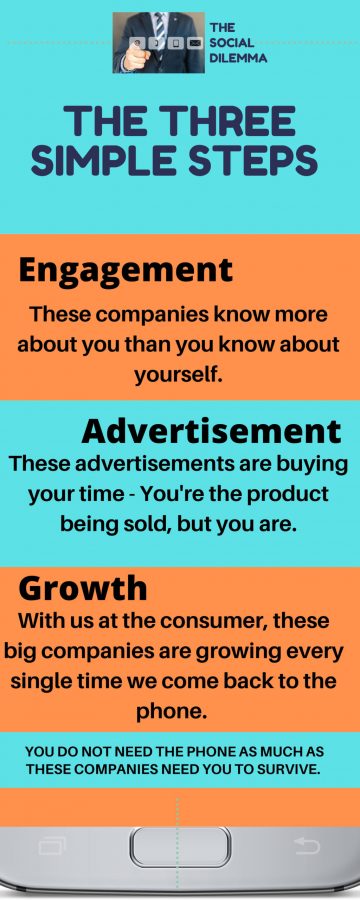Netflix’s “The Social Dilemma” shows the real dangers of social media
December 3, 2020
The new Netflix documentary-drama “The Social Dilemma” explores how the internet’s most popular media outlets such as Instagram, Gmail, Facebook and Twitter track and watch their users.
The film couldn’t be more relevant, discussing the influences of companies on elections, ethnic violence and rates of depression and suicide.
Former employees of major Silicon Valley industries, including Tristan Harris, a former Google design ethicist who was a part of the early stages of Gmail, Jeff Seibert, a former executive for Twitter, Bailey Richardson, who was a part of the early stages team for Instagram, as well as 18 additional former employees of big social media companies, discuss the pitfalls of social media in an astonishing manner.
These former employees go into great detail about how they created technology that manipulated the human psyche. Though throughout the documentary-drama they express apologies for having a hand in these technology advancements, explaining their regrets of what they unleashed.
“These apps want you to spend as much time as possible on the internet so they can get more data to then keep your attention for longer, creating this terrible cycle,” senior Jessica Schramm said. “What I thought was mindless scrolling on Instagram or TikTok is really just a strategy to get me to view more ads and spend more time on the internet.”
To these social media businesses, it’s about their personal interests in making money off of anything they can. But it grows deeper than that. The documentary discusses the three main goals of social media: engagement, growth and advertisement.
The main idea? “If you’re not paying for the product, you are the product.”
Advertisement: You think that these advertisements you see on your screen are desperate for your time and money, longing for your attention. You wouldn’t think that you’re the product being sold, but you are.
“Because we don’t pay for the products that we use, advertisers pay for the products that we use. Advertisers are the customers, we are the things being sold,” former Firefox and Mozilla labs employee Aza Raskin, said.
You see all these ads when you play your favorite game or when you get five diamonds in a game in exchange for watching a one-minute advertisement video. So, if you are enjoying a two-month free trial, who is paying for it if you aren’t?
“When you think about how some of these companies work, it starts to make sense. There are all these services on the internet that we think of as free, but they are not free,” former Facebook engineer Justin Rosenstein said. “They are paid for by advertisers. Why do advertisers pay those companies? They pay in exchange for showing their ads to us. We’re the product, our attention is the product being sold to advertisers.”
Engagement: The classic joke about the FBI agent in your phone takes a turn for the worse. The truth is, these companies are watching you 24/7, keeping track of what you are doing when you wake up and before you sleep. These companies know more about you than you know about yourself.
“Everything you are doing online, is being watched, is being tracked, is being measured,” former Twitter executive Jeff Seibert said. “Every single action you take is carefully monitored and recorded, exactly what image you stop and look at for how long you look at it.”
Growth: Tristan Harris explains how social media companies use the data they collect about users to create a model of them by comparing it to a hologram version of their users on the other side of the screen. These “people” behind the screen see every single video we watched, every single thing we’ve liked, shared, looked up and commented on. And it all goes to making this more accurate model of us, this hologram of us behind the screens. With that model, these companies can predict the kinds of things we do and like. These “models” keep users coming back for more.
“The documentary left me thinking about how many ads I really do see on my phone,” senior Jamie Valian said. “This shows that the big businesses are constantly trying to gain profit just from me when I go on my phone.”
This isn’t a matter of waking up to the realization that you are being watched, because people have known that for awhile now. It’s about being educated enough to understand the dangers of social media, to see how these companies manipulate the users.
The documentary ends with the employees urging viewers that the next step is to “change the conversation” around technology. Remember this next time you see an ad on your phone, you are just the product in this whole grand scheme.



